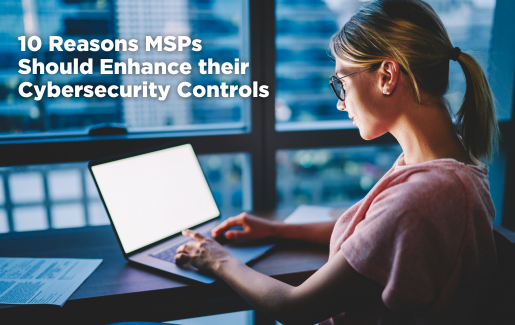 In today’s digital age, cybersecurity is now a critical component of every business, including MSPs. Using a set of standards or best practices should now be commonplace and represent a value proposition for MSPs. For anyone on the fence about implementing security controls to better protect their data and systems, here are 10 reasons to add them to your portfolio.
In today’s digital age, cybersecurity is now a critical component of every business, including MSPs. Using a set of standards or best practices should now be commonplace and represent a value proposition for MSPs. For anyone on the fence about implementing security controls to better protect their data and systems, here are 10 reasons to add them to your portfolio.
1. Increased Customer Trust
By implementing robust security controls, MSPs can build customer trust and confidence in their ability to protect their data and systems, leading to increased customer loyalty and retention. Prospective customers have become more discerning about the security practices of their solution providers and existing customers are now looking to their solution provider to take the lead and give direction on their own security as they look to protect their employees and customers.
2. Competitive Advantage
MSPs that can demonstrate a strong security posture can differentiate themselves from competitors and attract new clients looking for reliable and secure managed services. By demonstrating a commitment to cybersecurity and protecting customer data, MSPs can build trust and loyalty among their customer bases. This can give them an edge over competitors who may not prioritize cybersecurity.
3. Regulatory Compliance
Implementing security controls can help MSPs comply with industry-specific regulatory requirements, avoiding costly penalties and reputational damage. Whether you are bound by regulatory compliance or not, adopting a framework is a great way to prepare for customer demands that may put regulatory requirements on your business. While there may be upfront costs associated with implementing robust cybersecurity measures, the potential financial impact of not aligning with an industry recognized framework (regulatory or not) pales in comparison to these initial investments. Being able to show evidence of how your company, you can avoid costly legal fees, regulatory fines and damage to your reputation.
4. Business Continuity
Effective security controls can help MSPs ensure business continuity in the event of security incidents or disasters, minimizing downtime and disruption for their clients. One might say business continuity is a crucial aspect of any successful business. The ability to continue operations even in the face of adversity or unexpected events is a testament of an MSP who continuously improves, tweaks and modifies to stay resilient against the ever-changing threat landscape.
5. Reduced Risk of Data Breaches
Implementing security controls can significantly reduce the risk of data breaches, preventing potential financial and reputational damage for MSPs and their clients. One might say actions speak louder than words. Employee education, regular patching of systems and, of course, a comprehensive risk assessment is critical in not only reducing the risk of a breach but also in minimizing the impact in the event a breach does occur.
6. Enhanced Brand Reputation
A strong security posture can enhance MSPs' brand reputation as reliable and trustworthy partners in managing their clients' IT operations. Getting hit by an incident that exposes sensitive data or prevents your business from operating for any length of time can be catastrophic to your business. How you handle the incident based on a posture that has evidence to support doing everything that was reasonably possible (following and enhancing your security controls) can be the difference between staying in business or going out of business.
7. Improved Operational Efficiency
Implementing security controls can reduce the risk of security incidents and the need for remediation, freeing up time and resources for MSPs to focus on core business activities. We get so hung up on how well we address safeguards and security controls that we often lose sight of OK is better than nothing at all. Over time your posture will improve if you stick to it and surprise your process and procedures will also improve.
8. Risk Management
Effective security controls can help MSPs manage risk more effectively, reducing exposure to potential threats and vulnerabilities. One of the key aspects of risk management is risk management. Evaluating the likelihood and potential impact of each identified risk. By assessing the risks, MSPs can prioritize them based on their significance and allocate resources and develop plans to minimize their impact and ensure business continuity.
9. Increased Revenue Opportunities
MSPs that can demonstrate a strong security posture can open up new revenue opportunities in security-related services and consulting. When your customers know that you have taken the necessary steps to protect their data by implementing the appropriate cybersecurity safeguards and controls it leads to customer loyalty. Your clients and client prospects are becoming more aware of the importance of cybersecurity and are actively seeking out MSPs that prioritize data protection.
10. Peace of Mind
Implementing security controls can provide peace of mind to MSPs and their clients, knowing that their data and systems are protected by industry-standard security measures. When I ran an MSP company, I found myself losing sleep when things stopped working and today the probability that it is a bad hard drive is almost zero. When you focus on implementing the appropriate cybersecurity controls and safeguards and continuously work to improve and enhance them you become resilient. You get back the ability to sleep at night knowing that your approach to cybersecurity is continuously improving. It might not be perfect but the threat actors aren’t looking for those taking cybersecurity seriously – they are targeting those who don’t put any effort into it at all.
Want to Get Recognized as a Cyber Expert?
Learn more about earning the CompTIA Cybersecurity Trustmark
Chris Johnson is the senior director of cybersecurity compliance programs at CompTIA.

 Add CompTIA to your favorite RSS reader
Add CompTIA to your favorite RSS reader

